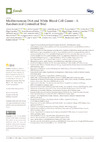Identificador persistente para citar o vincular este elemento:
https://accedacris.ulpgc.es/jspui/handle/10553/107978
| Título: | Mediterranean diet and white blood cell count-a randomized controlled trial | Autores/as: | Hernáez, Álvaro Lassale, Camille Castro-Barquero, Sara Babio, Nancy Ros, Emilio Castañer, Olga Tresserra-Rimbau, Anna Pintó, Xavier Martínez-González, Miguel Ángel Corella, Dolores Salas-Salvadó, Jordi Alonso-Gómez, Ángel M. Lapetra, José Fiol, Miquel Gómez-Gracia, Enrique Serra Majem, Luis Sacanella, Emilio García-Arellano, Ana Sorlí, José V. Díaz-López, Andrés Cofán, Montserrat Estruch, Ramón |
Clasificación UNESCO: | 32 Ciencias médicas 3206 Ciencias de la nutrición |
Palabras clave: | Leukocytosis Leukopenia Mediterranean Diet Prevention Randomized Controlled Trial, et al. |
Fecha de publicación: | 2021 | Publicación seriada: | Foods | Resumen: | We aimed to assess the effects of the antioxidant-rich Mediterranean diet (MedDiet) on white blood cell count. Our study population included participants in the PREvención con DIeta MEDiterránea study (average age 67 years old, 58% women, high cardiovascular risk). We assessed whether a MedDiet intervention enriched in extra-virgin olive oil or nuts, versus a low-fat control diet, modified the incidence of leukocytosis (>11 × 109 leukocytes/L), mild leukopenia (<4.5 × 109 leukocytes/L), or severe leukopenia (<3.5 × 109 leukocytes/L) in individuals without the condition at baseline (n = 3190, n = 2925, and n = 3190, respectively). We also examined whether MedDiet modified the association between leukocyte count alterations and all-cause mortality. Both MedDiet interventions were associated with a lower risk of developing leukopenia (incidence rates: 5.06% in control diet, 3.29% in MedDiet groups combined; hazard ratio [95% confidence interval]: 0.54 [0.36-0.80]) and severe leukopenia (incidence rates: 1.26% in control diet, 0.46% in MedDiet groups combined; hazard ratio: 0.25 [0.10-0.60]). High cumulative adherence to a MedDiet was linked to lower risk of leukocytosis (incidence rates: 2.08% in quartile 1, 0.65% in quartile 4; HRQ4-Q1: 0.29 [0.085-0.99]) and attenuated the association between leukopenia and all-cause mortality (Pinteraction = 0.032). In brief, MedDiet decreased the incidence of white blood cell count-related alterations in high cardiovascular risk individuals. | URI: | https://accedacris.ulpgc.es/handle/10553/107978 | ISSN: | 2304-8158 | DOI: | 10.3390/foods10061268 | Fuente: | Foods [EISSN 2304-8158],v. 10 (6), (Junio 2021) |
| Colección: | Artículos |
Citas SCOPUSTM
4
actualizado el 08-jun-2025
Citas de WEB OF SCIENCETM
Citations
6
actualizado el 15-feb-2026
Visitas 10
82
actualizado el 10-ene-2026
Descargas
56
actualizado el 10-ene-2026
Google ScholarTM
Verifica
Altmetric
Comparte
Exporta metadatos
Los elementos en ULPGC accedaCRIS están protegidos por derechos de autor con todos los derechos reservados, a menos que se indique lo contrario.
